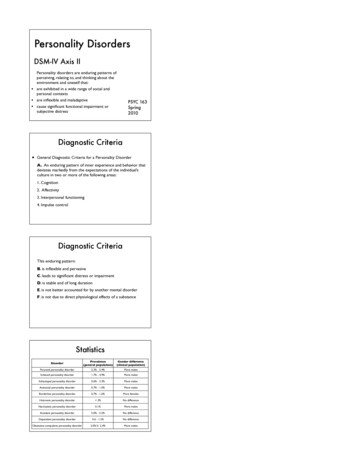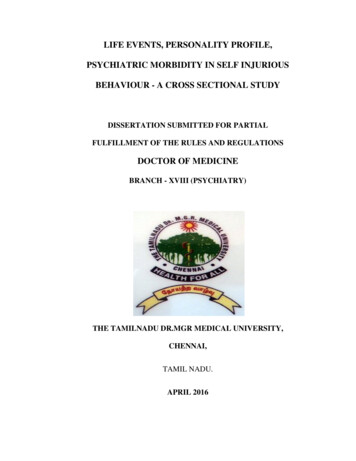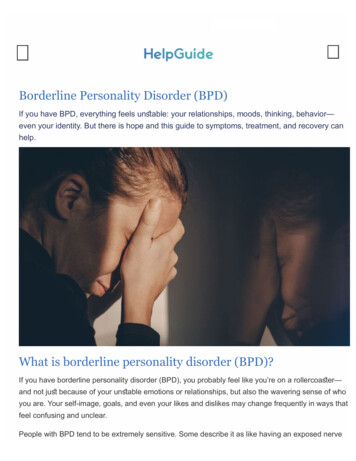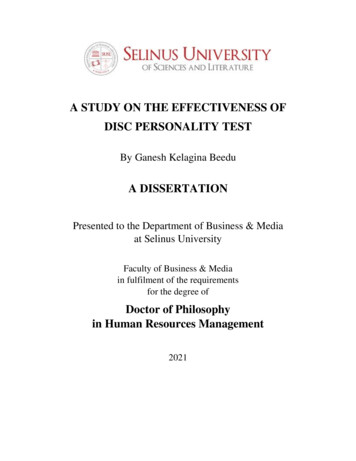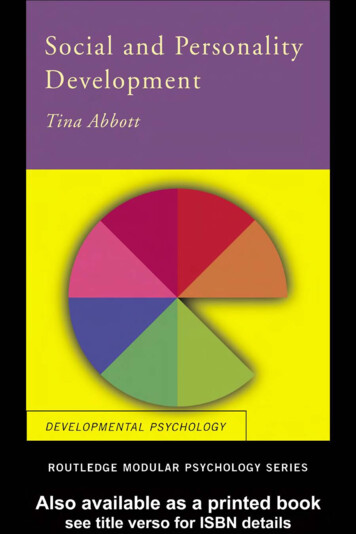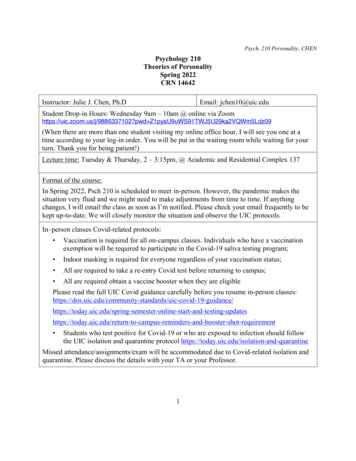
Transcription
Psych. 210 Personality, CHENPsychology 210Theories of PersonalitySpring 2022CRN 14642Instructor: Julie J. Chen, Ph.DEmail: jchen10@uic.eduStudent Drop-in Hours: Wednesday 9am – 10am @ online via Zoomhttps://uic.zoom.us/j/9886337102?pwd Z1pyaU9uWS91TWJ5U29ka2VQWm5Ldz09(When there are more than one student visiting my online office hour, I will see you one at atime according to your log-in order. You will be put in the waiting room while waiting for yourturn. Thank you for being patient!)Lecture time: Tuesday & Thursday, 2 – 3:15pm, @ Academic and Residential Complex 137orFormat of the course:In Spring 2022, Psch 210 is scheduled to meet in-person. However, the pandemic makes thesituation very fluid and we might need to make adjustments from time to time. If anythingchanges, I will email the class as soon as I’m notified. Please check your email frequently to bekept up-to-date. We will closely monitor the situation and observe the UIC protocols.In–person classes Covid-related protocols: Vaccination is required for all on-campus classes. Individuals who have a vaccinationexemption will be required to participate in the Covid-19 saliva testing program; Indoor masking is required for everyone regardless of your vaccination status; All are required to take a re-entry Covid test before returning to campus; All are required obtain a vaccine booster when they are eligiblePlease read the full UIC Covid guidance carefully before you resume in-person -shot-requirement Students who test positive for Covid-19 or who are exposed to infection should followthe UIC isolation and quarantine protocol ed attendance/assignments/exam will be accommodated due to Covid-related isolation andquarantine. Please discuss the details with your TA or your Professor.1
Psych. 210 Personality, CHENTeaching Assistants & TA office hours:TAOffice HourGabby Pena gpena21@uic.eduBy appointmentCarlos Rosas crosas6@uic.eduBy appointmentOverview:This course is designed to provide a survey of the field of personality, focusing on approaches that arerelevant to psychotherapy and well-being. Classical and contemporary theoretical conceptualizations of theperson will be the primary focus of the course materials, although some time will also be spent consideringthe research has been conducted to test these theories.Optional Textbook (quiz and exam questions will come exclusively out of my lectures. Textbooks areoptional):Friedman H.S. & Schustack, M. W. (2015). Personality - Classic Theories and Modern Research. (6thEdition). Pearson. (Previous edition OK)Burger J. (2008). Personality (7th Edition). Thomson & Wadsworth. (Previous edition OK)Course Goals:1. To appreciate the sub-disciplines of research that defines personality psychology.2. To better understand the scientific method, in general, and the empirical research methods employedby personality psychology, in particular.3. To improve your critical thinking and analytical reasoning abilities within the context of personalitypsychology.4. To improve your ability to communicate personality psychological concepts and theories using theconventions of the field.5. Finally, to promote insight into both the people around you and yourself.2
Psych. 210 Personality, CHENCourse Objectives:To accomplish these goals, you will:1. Survey seven distinct areas of research within personality psychology, ranging from thepsychoanalytic perspective, to contemporary theories of self-regulation.2. Analyze and reflect on how the different methodologies that are commonly used in each area ofresearch help to converge on a more complete understanding of the mechanisms involved in a givenaspect of personality.3. Complete a variety of personality inventories and consider your personal results in relation todifferent population distributions.4. Reflect on and apply a theory of personality to your own life.Grades breakdownYour final grade will be determined by means of the required examinations, paper and assignments (seebelow). Your final grade will be derived from your performance as follows:Four Homework Assignments (15 points X 4 60 points)Starting from Lecture 3 for four consecutive lectures, SHORT paper will be assigned in lecture. Youwill write about your thoughts and reflections on a question I ask based on the lecture materials of thatweek. The purpose of the homework is to help you reflect upon your own personality using the theory youlearn from the lectures. Usually there is no single correct answer to the question. I expect you to show methat you are learning and thinking.A total of 4 homework assignments will be given throughout the semester.Format of the Homework: 250 words minimum; Include your name on the assignment.Submit all HW Assignments on Blackboard via Assignment. The submission deadline is always by11:59pm on the due day. NO HARDCOPY is accepted. NO LATE assignment is accepted.Four exams – (60 points X3 180 points. Three required. Drop one low score if you take all four)The format of the exams is multiple choices. Each exam has 30 questions and covers approximatelythree chapters of materials. You can miss one exam with no questions asked (final included). If you take allfour, I will drop the lowest score when I calculate the final grade.All exams will be conducted in person unless otherwise noted. We will use a scantron for the exams.Please prepare a pencil.All exams are closed-notes.Paper (100 points)3
Psych. 210 Personality, CHENOne of the goals of psychology is to help people learn more about themselves. In addition to gaininginsight into yourself, applying the topics covered in class to your life helps make the course come to life.The best way to do this in a personality class is to use the theories we learn to discuss your own personalityand how it has developed.To accomplish this goal, you will complete a paper to discuss your personality and how it can beexplained by two different theories you learn from class. You will pick three aspects of your personality anduse two or three theories to discuss each aspect (you can use one theory to discuss two aspects and a secondtheory to discuss the third aspect; or you can use a different theory for each aspect. It’s not acceptable to useone theory to discuss all three aspects). The paper should be 5 - 7 pages long (double spaced, excluding thetitle page and the reference page), have at least three references, and should be in APA style. See the termpaper guideline document for more detailed instructions.Weekly Quizzes (Approximately 40 points)Starting from week 3, pop quizzes will be given in class. They will be in the form of multiplechoices question, true or false question, or fill-in-the-blanks questions. Pop quizzes will be administered onBlackboard.Total possible points 60 180 100 40 380GradesYour grade will be assigned according to the following scale.A342 - 380C266 - 303B304 - 341D228 - 265F 227 or belowLate Paper PolicyIf you have difficulty to finish the paper on time, please discuss with me about your situation INADVANCE. An extension may be granted. Otherwise late paper submission will receive point deduction(10 points per day, till zero).BlackboardWe will use Blackboard to share course materials, collect assignments, and post grades.Student drop-in hoursYou don’t need an appointment for my online student drop-in hours. Simply log in to the link I share on4
Psych. 210 Personality, CHENBlackboard. When there are multiple people coming to my office hour, we’ll follow the first come firstserve rule.Email PolicyPlease ALWAYS include the course information in your email (Psch 210) to avoid confusion on my part.And please sign your full name in your email if it's not already obvious in your email body.Religious Holidays:Religious holidays are respected. If you need accommodations for religious reasons please contact me inadvance. Arrangements can be made on individual basis.Student Athletes:Student athletes are required to provide the list of days that they will miss throughout the semester. Otheraccommodations such as exams on the road or paper extension may be arranged with the assistance of theAthletic Office.Special Accommodations:For students with documented physical or learning disabilities, I’m happy to provide any specialaccommodation that is needed. Please inform me of your situation within the first two weeks of thesemester.Additional Assistance:It is my job to help you succeed in this class. It is your job to try. Please take full advantage of our officehours. Never hesitate to bring forward a question. If you feel that you need additional sources of help, youmay also consult the: Writing center http://www.uic.edu/depts/engl/writing/Academic IntegrityIt is every student's responsibility to observe academic integrity. Cheating on exams or plagiarism on theterm paper is prohibited. I will elaborate on what constitutes plagiarism in the term paper guideline, and alsoat the live session when I give the introduction on the term paper. Cheating and plagiarism will result infailure of assignments/exams to failure of the course.Counseling services:UIC and the Department of Psychology provide a variety of services for students who experience mental orpsychological difficulties, if such need occurs, please refer to the following:5
Psych. 210 Personality, CHEN Counseling center: http://www.uic.edu/depts/counseling/ Office of Applied Psychological Services: http://portal.psch.uic.edu/Clinical/centers.aspx Campus Advocacy Network: http://www.uic.edu/depts/owa/advocacy.htmlCourse ScheduleNote: This is a tentative schedule for the lecture materials in this semester. I may change the contentof the chapters as we move along.DateWEEK 1(01/10 –01/14)WEEK 2TopicAssignmentsGeneral introduction of courseCourse syllabusResearch methodsCronbach (1957)Issues in Personality assessmentsCronbach, &Meehl (1955)Psychoanalytic theoryFreud (1914)Psychoanalytic theoryJung (1921)(01/17 –01/21)WEEK 3(01/24 –01/28)WEEK 402/01ReadingExam 1General introduction;Research methods;Assessments;Psychoanalytic.Neo-analytic theories(HW1 due)(01/31 –02/04)6Maslow (1943)
Psych. 210 Personality, CHENNeo-analytic theoriesWEEK 5(02/07 –02/11)Humanism(HW2 due)HumanismWEEK 6(02/14 –02/18)Trait theory(HW3 due)McCrae & Costa(1987)Trait theoryWEEK 7(02/21 –02/25)Harlow (1958)02/24Exam 2Neo-analytic;Humanism;Trait.WEEK 8(02/28 –03/04)WEEK 9(03/07 –03/11)WEEK 10(03/14 –03/18)WEEK 11(03/21 –03/25)Information on the term paper(HW4 due)Motive theoryBehaviorismSkinner (1948)BehaviorismWhite (1959)Biological approachBiological approachSpring BreakNo Class7
Psych. 210 Personality, CHENBiological approachWEEK 12(03/28 –04/01)03/31Exam 3Motive;Behaviorism;Biological.WEEK 1304/05Term paper final Q and A(04/04 –04/08)(Paper due by11:59pm onSafeAssign)Cognitive approachCognitive approachWEEK 14(04/11 –04/15)Self-regulationPersonality and cultureWEEK 15(04/18 –04/22)Personality and cultureFinal review and wrap upWEEK 16(04/25 –04/29)Final papergrade revealed04/28Exam 4Cognitive;Self-regulation;Culture.Reading list:Cronbach, Lee J. (1957). The two disciplines of scientific psychology. American Psychologist, 12, sciplines/8
Psych. 210 Personality, CHENCronbach, Lee J. & Meehl, Paul E. (1955). Construct validity in psychological tests. PsychologicalBulletin, 52, nstruct.htmFreud, Sigmund. (1914). The history of the psychoanalytic ory/index.htmJung, Carl G. (1921). General description of the types. Chapter 10 of Psychological mHarlow, Harry F. (1958). The nature of love. American Psychologist, 13, .htmMaslow, Abraham H. (1943). A theory of human motivation. Psychological Review, 50, vation.htmMcCrae, R. R., & Costa, P. T. (1987). Validation of the five-factor model of personality across instrumentsand observers. Journal of Personality and Social Psychology, 52(1), 81-90.Skinner, B. F. (1948). 'Superstition' in the pigeon. Journal of Experimental Psychology, 38, eon/White, R. W. (1959). Motivation Reconsidered: The concept of competence. Psychological Review, 66, 297– 333.9
Psych. 210 Personality, CHENExam responsibility:Exam 1&2: GabbyExam 3&4: Carlos10
Psych. 210 Personality, CHEN 1 Psychology 210 Theories of Personality Spring 2022 CRN 14642 . UIC and the Department of Psychology provide a variety of services for students who experience mental or psychological difficulties, if such need occurs, please refer to the following:





